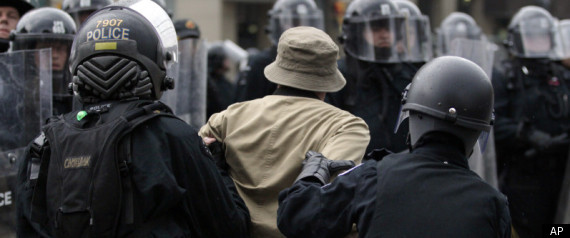 CBC -- Newly released G8/G20 summit documents reveal the RCMP and various Ontario police forces spent several months infiltrating anti-war, anti-globalization and anarchist groups with the use of undercover officers ahead of last June's summits in Huntsville and Toronto.
CBC -- Newly released G8/G20 summit documents reveal the RCMP and various Ontario police forces spent several months infiltrating anti-war, anti-globalization and anarchist groups with the use of undercover officers ahead of last June's summits in Huntsville and Toronto.The reports by the Joint Intelligence Group formed by the RCMP-led ISU (Integrated Security Unit) show that various police services contributed at least 12 undercover officers to take part in covert surveillance of potential "criminal extremists" in a bid to "detect … and disrupt" any threats.
PHOTOS: G20 Protests In Toronto
The reports omit details on specific individuals or groups, nor do they offer conclusions about what, if any, crimes or plots of violence were detected.
"There's a lot of stuff that isn't in there, that's been redacted, or isn't spelled out. But it says these undercover operations were going on, that there were 12 officers," says Tim Groves, who requested and obtained the reports through an access to information request. "The problem is that, looking at these documents, police expected criminal extremism everywhere."
Groves, an investigative journalist and active participant in the alternative media centre during last summer's G20 summit in Toronto, agreed to share the police documents with CBC News.
CBC's independent analysis of the police records reveals:
- The RCMP set up a Joint Intelligence Group in January 2009, which in turn assigned a dozen officers to a covert PIIT (Primary Intelligence Investigative Team) expressly for monitoring and infiltrating suspected extremist networks.
- The joint-forces PITT had a mandate to use undercover officers and informants from within the ranks of protest networks, not just to monitor potential criminal activity by organizers, but also to "deter, prevent, investigate and/or disrupt" threats to the summit.
- The investigative team created and shared files on a long list of individuals, colour coding them according to perceived risk level as red (suspect), orange (person of interest) and yellow (associate).
Police identified "criminal extremists" as a significant threat to the Canadian summits, targeting anti-capitalist groups with grievances tied to the environment, animal rights and First Nations resource-based issues. They noted, however, that "in Canada the criminal extremist activity has never reached the level experienced in some European countries."
Laurentian University Prof. Gary Kinsman, a sociologist and historian who has written extensively on RCMP surveillance, says "anti-capitalist perspectives, anarchist perspectives, socialist perspectives, almost get criminalized."
"This is part of a long history of Canadian security police [involved in] major forms of surveillance including infiltration of various different social movements, including the union movement, the gay movement at times, " Kinsman says.
Kinsman acknowledges police may have targeted people who they suspected were actively plotting violence or criminal activity. What surprises him, though, is that according to the ISU documents, undercover officers had an expressed mandate to do more than simply watch and wait for crimes to be committed.
He says their intelligence gathering was used as a basis for pre-emptive arrests of some 50 protest organizers on charges of conspiracy (many of which have been dropped, while 17 remain before the courts.)
"A large number of the people charged with conspiracy were arrested prior to anything happening on that Saturday demonstration," Kinsman told CBC News, saying he himself was among the peaceful demonstrators at last year's Toronto summit.
"So the evidence collected from the people who infiltrated the activist groups was basically used to criminalize the organizers, prior to anything actually taking place."
In addition to the advance surveillance, plainclothes officers, in teams of at least four, were stationed throughout the crowds at the G8/G20 demonstrations as "event monitors" who were required to "provide real time intelligence of demonstration or large gatherings of protesters where there is pre-existing intelligence and/or evidence of violence," according to the ISU documents
These event monitors were also charged with tracking and reporting on the movements of buses, vans and trains carrying protest groups to and from the summits.
Groves, who initially obtained the police surveillance reports, notes that "they did all this intelligence gathering and there are still things getting broken on the street."
He questions whether all the undercover work served any purpose, given the agitators who still managed to smash windows, loot stores and set police cars on fire with virtually no police intervention.
News of the police surveillance has only served to send a chill through the activist community, he says, making many of its members more distrusting of police, and perhaps hardening their anti-state views.
Toronto police in a report released Thursday reviewing the success and failures of the G20 summit gave credit to the advance intelligence gathering by the RCMP and the Integrated Security Unit, but also identified problems.
"In the dynamic public order events on June 26 and June 27 there were delays in the timely delivery of important tactical intelligence to the end users in the [central police command centre]."
Origin
Source: Huffington
No comments:
Post a Comment